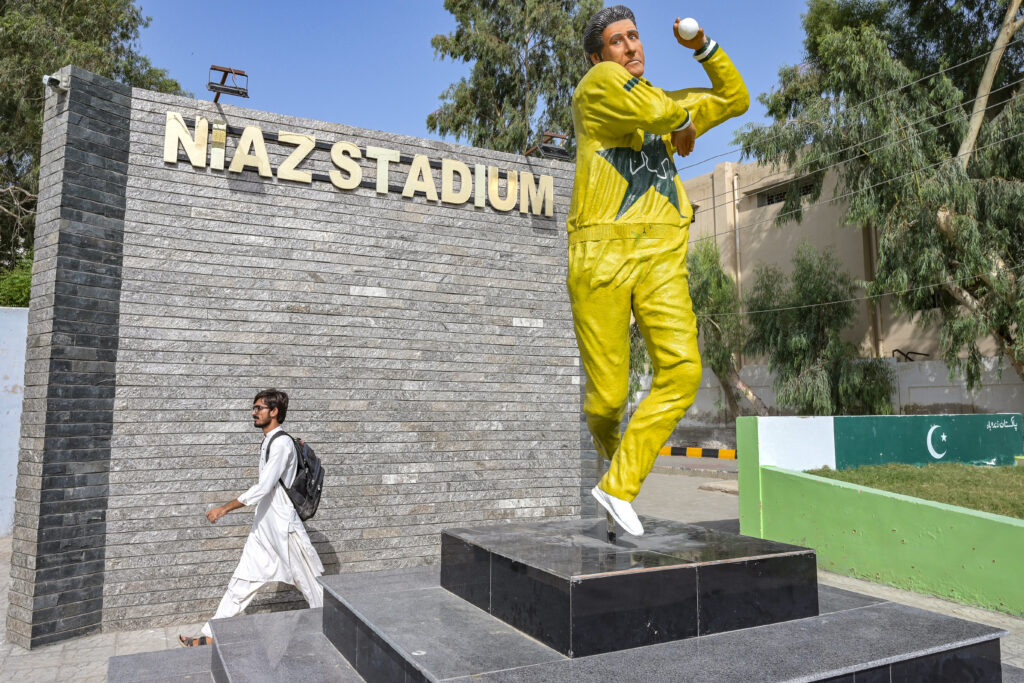At least 265 dead in India plane crash, one passenger survives
A London-bound passenger jet crashed in a residential area in the Indian city of Ahmedabad on Thursday, killing at least 265 people on board and on the ground — but one passenger has miraculously survived.An AFP journalist saw bodies being recovered from the crash site, and the back of the Boeing 787-8 Dreamliner — which had 242 passengers and crew on board — hanging over the edge of a building it hit around lunchtime.The government opened a formal investigation into the cause of the crash, and rescue teams worked into Friday morning scouring the charred wreckage with sniffer dogs.”The tragedy in Ahmedabad has stunned and saddened us,” Prime Minister Narendra Modi said after Air India’s flight 171 crashed following takeoff. “It is heartbreaking beyond words”.Deputy Commissioner of Police Kanan Desai told reporters said that “265 bodies have reached the hospital”.That suggests that at least 24 people died when the jet ploughed into a medical staff hostel in a blazing fireball — and that the toll may rise further as more bodies are located.- ‘Devastating’ -The AFP journalist saw a building ablaze after the crash, with thick black smoke billowing into the air, and a section of the plane on the ground.”One half of the plane crashed into the residential building where doctors lived with their families,” said Krishna, a doctor who did not give his full name.”The nose and front wheel landed on the canteen building where students were having lunch,” he said.Krishna said he saw “about 15 to 20 burnt bodies”, while he and his colleagues rescued around 15 students.India’s civil aviation authority said two pilots and 10 cabin crew were among the 242 people on board.Air India said there were 169 Indian passengers, 53 British, seven Portuguese, and a Canadian on board the flight bound for London’s Gatwick airport.UK Prime Minister Keir Starmer said the scenes from the crash were “devastating”, while the country’s King Charles III said he was “desperately shocked”.- ‘Sole survivor’ -But while everyone aboard the flight was initially feared killed, state health official Dhananjay Dwivedi told AFP “one survivor is confirmed” and had been hospitalised.Air India said in a statement that the “sole survivor is being treated in a hospital”, adding that the “survivor is a British national of Indian origin”.The survivor is believed to be 40-year-old Vishwash Kumar Ramesh. India’s Home Minister Amit Shah told reporters he was speaking to them “after meeting him”.The BBC and Britain’s Press Association news agency spoke to Ramesh’s family members.”He said, ‘I have no idea how I exited the plane'”, his brother Nayan Kumar Ramesh, 27, told PA in the British city of Leicester.- ‘Devastating’ -The plane issued a mayday call and “crashed immediately after takeoff”, the Directorate General of Civil Aviation said.Ahmedabad, the main city of India’s Gujarat state, is home to around eight million people and the busy airport is surrounded by densely packed residential areas.”When we reached the spot, there were several bodies lying around and firefighters were dousing the flames,” resident Poonam Patni told AFP.”Many of the bodies were burned,” she said.The AFP journalist saw medics using a cart to load bodies into an ambulance, while a charred metal bed frame stood surrounded by burnt wreckage.US planemaker Boeing said it was in touch with Air India and stood “ready to support them” over the incident, which a source close to the case said was the first crash for a 787 Dreamliner.The UK and US air accident investigation agencies announced they were dispatching teams to support their Indian counterparts.Tata Group, owners of Air India, offered financial aid of 10 million rupees ($117,000) to “the families of each person who has lost their life in this tragedy”, as well as funds to cover medical expenses of those injured.India has suffered a series of fatal air crashes, including a 1996 disaster when two jets collided mid-air over New Delhi, killing nearly 350 people.In 2010, an Air India Express jet crashed and burst into flames at Mangalore airport in southwest India, killing 158 of the 166 passengers and crew on board.Experts said it was too early to speculate on what may have caused Thursday’s crash.”It is very unlikely that the plane was overweight or carrying too much fuel,” said Jason Knight, senior lecturer in fluid mechanics at the University of Portsmouth.”The aircraft is designed to be able to fly on one engine, so the most likely cause of the crash is a double engine failure. The most likely cause of a double engine failure is a bird strike.”India’s airline industry has boomed in recent years with Willie Walsh, director general of the International Air Transport Association (IATA), last month calling it “nothing short of phenomenal”.The growth of its economy has made India and its 1.4 billion people the world’s fourth-largest air market — domestic and international — with IATA projecting it will become the third biggest within the decade.







